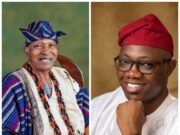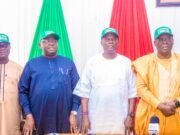Nigeria’s political future seems to have crystallised around the candidacy of incumbent president, Muhammadu Buhari of the APC, and Alhaji Atiku Abubakar of the PDP. For reasons that can only be explained away in terms of the way we are used to doing things in the country, a good number of our compatriots seem to have reconciled themselves to the defeatist notion that the fate of Nigeria or its people is inevitably tied or reduced to a choice between these two, as if registering a vote for a more credible candidate, and so committing ourselves to a different future by what we do now, is not even an option. Is it not a national tragedy that out of some 70 candidates vying for its Presidency, the country is fixated on the two who definitely cannot give her the future we all deserve?
While there are compelling reasons to vote out the Buhari government due to its appalling record of performance, the overarching willingness to replace it with a government led by Atiku Abubakar betrays a lack of the capacity to appreciate the very nature and sources of our problems as a nation, and a display of clear lack of thoughtfulness that have plagued Nigerians and prevented us from charting for ourselves a different course from that which the country’s backward, visionless and evidently destructive political class has led it for almost 60 years.
One way to look at the Atiku presidency project is the manner in which it has evolved over the years. A phrase that keeps popping up is ‘unbridled ambition’. He is clearly possessed of a desperate streak; and desperate people are a danger to any noble enterprise. They are a self-driven people whose overweening desire is usually the attainment of a personal goal disguised as a cause for general good. For them, no means are too indecent to be deployed just to lay hold of the object of their desperation. That Atiku has so far not realised his desperate desire to rule Nigeria is a lucky stroke for the country. Sadly though, things may yet work out for him, for once, especially if the people who are being protected from him are hell-bent on having him as their anointed king.
Admittedly, character is a very scarce commodity among almost all Nigerian politicians, but Atiku typifies some of the most extreme variety of an unprincipled horde that populates our political firmament. It should not be rocket science to figure out that anyone who would sleep or lie with just about anyone, practically compromise anything to get what they want, is hardly a model character, let alone a healthy choice for leadership.
His ambition has largely shaped his modes of operation. The only means Atiku understands as the most effective way to overcome any obstacle is to throw monies at them, usually as a compromising element. We still grapple with widespread corruption at the moment, but with Atiku in the saddle, Nigeria stands the risk of being turned into one huge institutionalised haven of officially-sanctioned kick-backs.
The most common argument you hear is that, after all, the APC and Buhari too are corrupt! That is hardly disputed, and those who gather under the APC party umbrella are not being exonerated here. But the question is: why not spare a thought for the exploration of a third option and walk a new path? In any case, the point here isn’t about political parties – especially since there are no real differences between the two dominant ones. It is about characters, and specifically a character who may be within reach of the highest office in the land.
We have started to hear how he ran or still runs a successful business. Really? Which business, and for who? Intels, the logistic company he runs and with which he has amassed obscene wealth, runs as a virtual monopoly in the logistics sector of the nation’s oil and gas industry. Its financial success probably has more to do with the ‘influence’ of its facilitator than for professional and strategic considerations. For far too long, it was the dominant, money-spinning handler of oil and gas-related logistics businesses in the entire Delta region. That was until recently when its activities started to come under official scrutiny for all manners of reasons including the political.
Atiku’s vaunted business successes are also not easily separated from his association with those who hold or have held levers of power. He is the political godson of the late Shehu Musa Yar’adua, another parasitic element and a beneficiary of Nigeria’s unjust allocation of privileges. At only thirty-six, Yar’adua was already a major general, becoming the powerful Chief of Staff, Supreme Headquarters, in the Obasanjo military government (the equivalent of a vice-president). He was also Nigeria’s minister for transport under the preceding Murtala Mohammed-led military government, where his ministerial jurisdiction covered the supervision of Nigeria’s extensive but corruption-ridden seaports.
Atiku also inherited Yar’adua’s extensive political machine – the PDM – which is being maintained across the country by a ruthless system of financial patronage. A run through a checklist of the quality of characters in the PDM over the years will reveal politicians whose careers have set back the fortunes of Nigeria by decades. These are the sort of companies Atiku keeps.
And let’s be clear. A preponderant portion of Atiku’s extensive personal wealth has been, and is still being used exclusively to maintain and service a political machine, aimed mainly at capturing the presidency. The corollary aim is to use political power to acquire and consolidate more economic power, regardless of how obscene in the midst of pervasive extreme poverty. Nation-building is an insignificant component of the ambition of politicians like Atiku. They don’t even know what that means.
To make Atiku an issue in a healthy political discussion of choice is a bit worrisome, and even more awkward at a time Nigerians should be charting a new leadership direction for the nation by deliberately going all the way to identify and promote clear alternatives to the present band of fortune wasters.
The only appeal Atiku has for a number of people who share a deep anti-Buhari sentiment is that he possesses what it takes in political clout to dislodge the latter. No one seems concerned or worried at all about his own values. An option which betrays clear helplessness is even being passed off as a pragmatic political strategy! The logic of this counterintuitive position is that once the Buhari government is out of the way, Nigeria’s current challenges get resolved regardless of who succeeds him!
The first thing to realise is that if Atiku is elected, the nation faces a potentially disastrous eight years rendezvous with a government certain to be filled with another set of even more predominantly self-serving, avaricious and vile breed of politicians. The other thing to note is that the more the prevailing political system is allowed to perpetuate itself, the more it becomes difficult to dislodge.
But a far deeper implication is that this is a rather desperate, short-term approach that Nigerians have always resorted to whenever they run into a political brickwall with the ruling class. The incontrovertible fact however is that the option has never brought any lasting benefits apart from perennial failed expectations. When a strategy hasn’t worked in almost 60 years of trial and error, you evidently need a clear volte face. There is an urgent need for a strategic rethinking of the political and moral choices we have been making as a people if we expect any real and lasting change.
The current ‘let’s-get-Buhari-out-at-any-cost’ attitude and its twin clamour of ‘let-Atiku-try-it-this-time-around’ are also just the typical backlash of opinions you get from a people whose minds have been corroded by years of material poverty, but also poverty of ideas. And it all perfectly fits the desires of a devious class of politicians who have increasingly used poverty and ignorance as ruthless instruments of disorientation against the Nigerian people.
If Nigerians exercise their voting rights in a premeditated fashion to foster change, any candidate can win an election, given the emerging realities in the management and conducts of elections. The one important take-away from the 2015 elections is that Nigerians are capable of deploying their voting capacity to alter the electoral geography and confound established wisdom in the land.
However, even if factors that bother on limited time, insufficient mobilisation and awareness make it impossible at the moment for a more credible candidate to win the crucial presidency, Nigerians can all rally round such candidacy as an initiating process for something different, a means to register a fresh new presence and chart a brand new future.
We all can utilise the opportunity of this electoral season to signal an intent to walk a totally different but tested route, put the charlatans on a quit notice, and commit ourselves to starting a political movement of awareness that may crystallise into a definitive change sooner than we think. Every small step that we start to take NOW will inch us towards an eventual destination of victory. Our compatriots must be sensitised to begin to think differently and to take the challenge of remodelling their own future more seriously.
The clear choice now is between investing in a longer term strategy of change that holds the immediate promise of reorienting, preparing and mobilising a sufficient proportion of the voting public to learn to wisely deploy their power to dislodge their longstanding oppressors sooner rather than later, or postpone that prospect of change by settling for another short cut, temporarily soothing option that is certain to lead to another destination of disappointment with the possibility of permanently consigning us and our children to the whims of a tiny, backward, self-driven avaricious class.


































